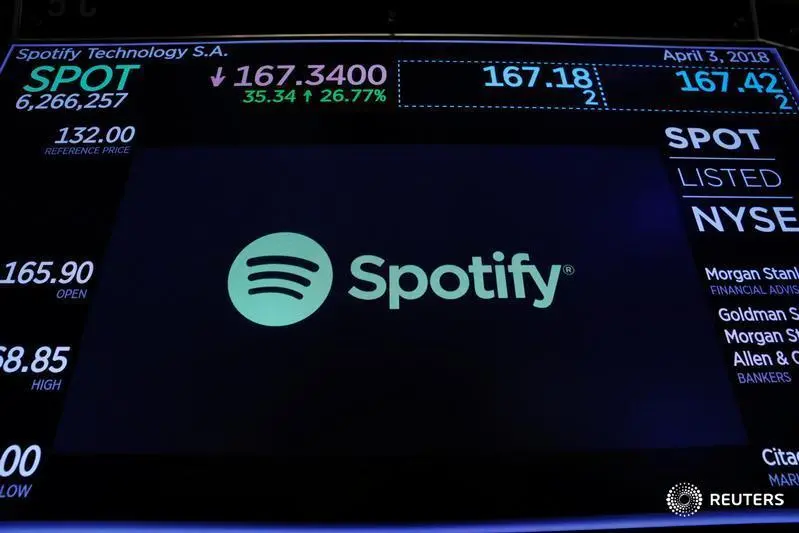PHOTO
NEW YORK- Spotify won a stonking $29 billion valuation in its early moments as a public company. The music-streaming service’s non-traditional float saved on investment-banking fees, gave insiders a potential way out, and also notched up a far higher valuation – at least to begin with – than the prices at which its stock had traded while privately held. Was it a real victory, either for the company or for its unusual method? Ask this time next year.
Spotify’s backers can be happy with their decision to pursue a so-called direct listing as opposed to the usual initial public offering. It is paying 29 million euros in fees to its financial advisers, and expects the total cost of the direct listing to be between 35 million and 40 million euros. A traditional IPO would probably generate at least twice as much as this in bankers’ fees alone. Moreover, while traditional floats leave the majority of shares locked up for up to half a year, over 90 percent of Spotify shares can be immediately traded.
A smooth market debut is nice to have, but more important is what comes next. Tech is littered with companies whose initial weeks or months of trading as a public company gave little indication of what was to come. Think camera maker GoPro , the value of which tripled in its first few months, before falling by over 90 percent. Spotify is losing money, and its revenue growth is slowing. Its long-term value depends on whether deep-pocketed adversaries like Apple decide to sell streaming music as a loss leader, or come up with better algorithms for song selection. The industry may also grow less than expected.
Meanwhile, expect Lyft, Airbnb, Pinterest and other unicorns, as private companies worth $1 billion or more are known, to get the hard sell from would-be IPO bankers, who have an added incentive to prove their worth. Direct listings’ higher liquidity and lower costs are tempting. But fixing the number of shares sold, and having an underwriter willing to stabilize the price, has its benefits. While a good start doesn’t guarantee a good long-term performance, a disastrous market debut can turn off customers, investors and talented employees.
Spotify and its direct listing won the popular vote on Tuesday. Whether its new valuation is the right one, and the old-fashioned IPO process has been disrupted, will only become clear later, as investors – and the company’s rivals – get a better look at what just hit the market.
CONTEXT NEWS
- Spotify shares began trading at $165.90 on April 3 as they debuted on the New York Stock Exchange. The music-streaming service directly listed its shares, allowing existing owners to sell directly to new investors, rather than undergoing a traditional initial public offering.
- At the price of $160 per share as of 1300 EDT, the company had a market valuation of $28.5 billion.
(Editing by John Foley and Martin Langfield)
© Reuters News 2018





















